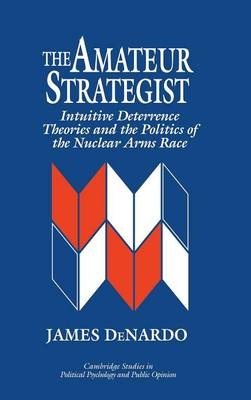
The Amateur Strategist
Intuitive Deterrence Theories and the Politics of the Nuclear Arms Race
Seiten
1995
Cambridge University Press (Verlag)
978-0-521-48121-2 (ISBN)
Cambridge University Press (Verlag)
978-0-521-48121-2 (ISBN)
This book, first published in 1995, explores how the everyday person reasons about nuclear strategy. James DeNardo's discovery that the amateur's strategic reasoning defies all conventional theories lays the groundwork for a new understanding of national security politics, and challenges the intellectual foundations of modern deterrence theory, public opinion studies, and game theory.
This book, first published in 1995, explores how the everyday person reasons about nuclear strategy. James DeNardo's data reveals surprising patterns of thinking on basic issues from SDI, arms control, and proliferation to the end of the Cold War. The book describes a fascinating cast of players, including 'Nice Hawks' like Ronald Reagan, who wanted to give SDI to the Russians, and the 'NIFFs,' whose procurement rule, expressed simply, was: 'If they have it, we don't want it, but they don't have it, we should get it.' To explain his remarkable evidence, Professor DeNardo presents an innovative theory of intuitive deterrence reasoning. He then confronts the theory with data from professional nuclear strategists. His discovery that the amateur's strategic reasoning defies all conventional theories lays the groundwork for a new understanding of national security politics. His demonstration that professional strategists reason like novices - that we are all Amateur Strategists - challenges the intellectual foundations of modern deterrence theory, public opinion studies, and game theory.
This book, first published in 1995, explores how the everyday person reasons about nuclear strategy. James DeNardo's data reveals surprising patterns of thinking on basic issues from SDI, arms control, and proliferation to the end of the Cold War. The book describes a fascinating cast of players, including 'Nice Hawks' like Ronald Reagan, who wanted to give SDI to the Russians, and the 'NIFFs,' whose procurement rule, expressed simply, was: 'If they have it, we don't want it, but they don't have it, we should get it.' To explain his remarkable evidence, Professor DeNardo presents an innovative theory of intuitive deterrence reasoning. He then confronts the theory with data from professional nuclear strategists. His discovery that the amateur's strategic reasoning defies all conventional theories lays the groundwork for a new understanding of national security politics. His demonstration that professional strategists reason like novices - that we are all Amateur Strategists - challenges the intellectual foundations of modern deterrence theory, public opinion studies, and game theory.
1. Introduction; 2. A primer on the Cold War nuclear debate; 3. An introduction to intuitive deterrence theories; 4. Competing hypotheses about nuclear thinking; 5. The novice strategists; 6. The intuitive calculus of nuclear deterrence; 7. Statistical tests of the intuitive nuclear calculus; 8. Expert nuclear reasoning; 9. The factional politics of strategy and the end of the Cold War arms race; 10. Nuclear thinking after the cold war.
| Erscheint lt. Verlag | 25.8.1995 |
|---|---|
| Reihe/Serie | Cambridge Studies in Public Opinion and Political Psychology |
| Zusatzinfo | 30 Tables, unspecified; 44 Line drawings, unspecified |
| Verlagsort | Cambridge |
| Sprache | englisch |
| Maße | 152 x 229 mm |
| Gewicht | 610 g |
| Themenwelt | Natur / Technik ► Fahrzeuge / Flugzeuge / Schiffe ► Militärfahrzeuge / -flugzeuge / -schiffe |
| Sozialwissenschaften ► Politik / Verwaltung ► Staat / Verwaltung | |
| ISBN-10 | 0-521-48121-X / 052148121X |
| ISBN-13 | 978-0-521-48121-2 / 9780521481212 |
| Zustand | Neuware |
| Haben Sie eine Frage zum Produkt? |
Mehr entdecken
aus dem Bereich
aus dem Bereich
von der Machtergreifung bis zur Gründung der Vereinten Nationen
Buch | Softcover (2023)
Motorbuch Verlag
CHF 38,90


